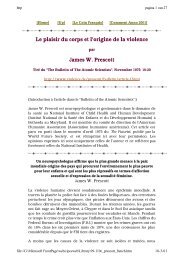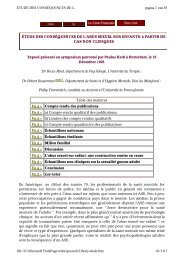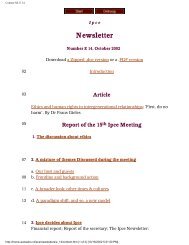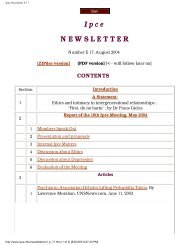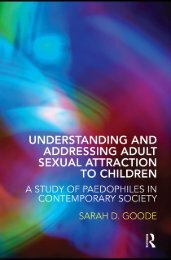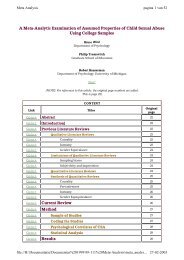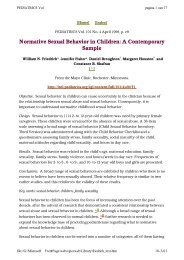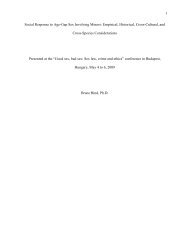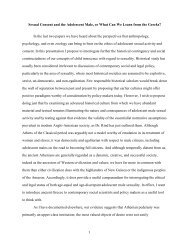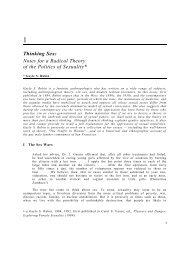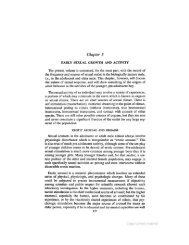Infant and Child Sexuality: A Sociological Perspective - Ipce
Infant and Child Sexuality: A Sociological Perspective - Ipce
Infant and Child Sexuality: A Sociological Perspective - Ipce
Create successful ePaper yourself
Turn your PDF publications into a flip-book with our unique Google optimized e-Paper software.
der st<strong>and</strong>ing the sexual structure <strong>and</strong> function, true communication cannot<br />
take place. The child senses that the parent has strong attitudes<br />
about sex. But he does not know what it is that the parent feels<br />
strongly about or why he feels that way.<br />
One might ask, if a parent feels unable to give correct information,<br />
are there types of misinformation that are less damaging to the<br />
child than others?! I submit that there are. Innocuous misinformation<br />
given rationally is apt to have less negative effect on the child than<br />
if the parent h<strong>and</strong>les the situation by going “into a rage.”<br />
I was over at a friend’s house <strong>and</strong> she <strong>and</strong> I were<br />
examining the contents of her dad’s dresser<br />
drawer. I remember her pulling out condoms, however,<br />
we thought they were balloons. We took them<br />
outside <strong>and</strong> proceeded to blow them up. Her mother<br />
came home <strong>and</strong> went into a rage. She told us they<br />
were naughty <strong>and</strong> that we should never play with<br />
such things again. As we were really scared, we<br />
told her that some kids had given them to us. Out<br />
of curiosity, we looked in all the drawers at my<br />
house. Again, eventually finding our so-called<br />
balloons in my dad’s drawer. This time we were<br />
caught filling them up with water. My mother simply<br />
explained that as I had some special possessions<br />
that I didn’t want people to touch, so did<br />
everyone else <strong>and</strong> that this was one of my dad’s.<br />
When asked what it was used for, we were told<br />
that it was used by dads in their work.<br />
Generally speaking the schools have been no better than the parents<br />
when it comes to sex education. Ambiguity, misinformation, mislabeling<br />
<strong>and</strong> excessive idealism often characterize sex instruction in the<br />
schools as well as at home. For example, a school principle told me<br />
that his school felt that it was being very progressive <strong>and</strong> was doing<br />
the right thing when they told children that every child born is the<br />
result of an act of love on the part of the parents. In this case, some<br />
progressive parents called in as consultants on the school’s sex education<br />
curriculum objected to such instruction, pointing out that such<br />
instruction was too idealistic. Not every child is the fruition of an<br />
act of love. In this case, the parents wanted the school to tell the<br />
truth!<br />
Sex Questions <strong>Child</strong>ren Ask of Parents<br />
If the home atmosphere is sexually repressive, the children do not<br />
ask many sex-related questions. Conn (1948) reports that twenty-nine<br />
percent of 128 boys <strong>and</strong> thirty percent of 72 girls in one of his studies<br />
had inquired about sexual topics. As a group, the more intelligent<br />
children offered more questions per child. But even in the superior<br />
group (I.Q. 111-140) the average number of sex inquiries did not rise<br />
above two questions for each child. The children (four to six years of<br />
age) used such information as they had received at home, <strong>and</strong> combining<br />
this information with their limited experiences, were able to produce<br />
naive explanations as to where babies come from, for instance. The<br />
child of this age thinks of “being born” in such terms as: “the baby is<br />
61



